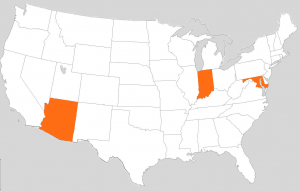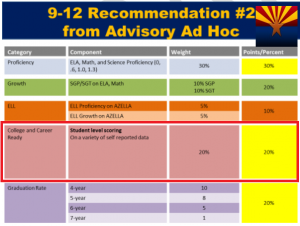 It is possible that 2017 will be a pivotal year for Career Technical Education (CTE). With planning underway to implement the Every Student Succeeds Act (ESSA) and a bill to reauthorize the Carl D. Perkins Career and Technical Education Act of 2006 recently introduced in the House, states are taking advantage of a policy window to advance new legislation and enhance CTE quality.
It is possible that 2017 will be a pivotal year for Career Technical Education (CTE). With planning underway to implement the Every Student Succeeds Act (ESSA) and a bill to reauthorize the Carl D. Perkins Career and Technical Education Act of 2006 recently introduced in the House, states are taking advantage of a policy window to advance new legislation and enhance CTE quality.
At the moment, Advance CTE is tracking more than 200 bills, regulations and actions across the states that are relevant to the CTE community. Although it is too early to identify major trends — or even know for certain if the proposals we are tracking will ever cross the finish line — what is clear is that there is an evident and growing interest in strengthening CTE at the state level. Recently, new laws in Maryland, Indiana and Arizona aim to strengthen apprenticeships, accountability and alternative pathways to graduation.
Maryland Aims to Expand Apprenticeships and Measure Completion through Accountability System
In Maryland, Governor Larry Hogan approved the More Jobs for Marylanders Act of 2017. A jobs Act, the legislation aims to strengthen the state workforce by
- issuing up to $2,000 each for eligible students enrolled in workforce development sequence programs, and
- allowing eligible employers to claim up to $1,000 in tax credits for each approved apprentice they employ.
Additionally, the law requires the state board of education to establish career readiness performance goals for CTE program completion, industry-recognized credential attainment and completion of a registered or youth apprenticeship. The state board must also work on a method to value apprenticeship completion in the state accountability system. Under the legislature’s recommendations, completion of a state-approved apprenticeship would be valued the same as earning a 3 or higher on an Advanced Placement exam.
The More Jobs for Marylanders Act is part of Gov. Hogan’s Maryland Jobs Initiative, which aims to strengthen Maryland’s workforce and create new jobs. Under the initiative, Gov. Hogan also plans to expand Maryland’s Pathways in Technology Early College High Schools (P-TECH) program, which was launched last year with the opening of two locations in Baltimore. Another bill passed by the legislature this year specifies requirements for the program and establishes a planning grant to help districts design and launch P-TECH programs.
Arizona State Board Approves Seventeen Measures of College and Career Readiness
 Over in the Grand Canyon State, the Arizona State Board of Education approved a comprehensive (albeit somewhat confusing) college and career readiness indicator to include in the state’s accountability system. The indicator (details start on p. 75 of the state board’s meeting minutes) will make up 20 percent of the overall accountability score and will include no less than seventeen separate measures of college and career readiness. Measures will include (but are not limited to)
Over in the Grand Canyon State, the Arizona State Board of Education approved a comprehensive (albeit somewhat confusing) college and career readiness indicator to include in the state’s accountability system. The indicator (details start on p. 75 of the state board’s meeting minutes) will make up 20 percent of the overall accountability score and will include no less than seventeen separate measures of college and career readiness. Measures will include (but are not limited to)
- industry-recognized credential attainment,
- work-based learning completion,
- completion of a CTE sequence, and
- aligned technical skills assessment.
The indicator will also include college readiness measures such as earning a passing score on the SAT or earning dual credit. The total college and career readiness score for a school will be calculated across the entire graduating student cohort, with schools able to earn additional points for students who complete both college and career readiness activities.
Indiana Students Will Have More Graduation Options Starting in 2018
Meanwhile, Indiana’s newly-elected Governor Eric Holcomb ushered in a few CTE reforms during his inaugural legislative session. SB198 restructures the state’s CTE funding schedule using a three-tiered classification system that recognizes wages and industry demand for the specified pathway. The law requires the Department of Workforce Development to set the wage threshold and classify the types of CTE programs eligible to receive funding at each level.
Furthermore, the bill creates a pilot program to integrate career exploration activities into the eighth grade curriculum using the state’s Career Explorer system. The program will be piloted in 15 schools, with the aim of expanding statewide beginning in the 2018-19 school year.
Gov. Holcomb also signed HB1003, which, in addition to replacing the state’s ISTEP test with a new program (ILEARN will be implemented in the 2018-19 school year), establishes alternative pathways to graduation. Starting June 30, 2018, students that meet the Indiana Core 40 requirements and demonstrate college and career readiness — to be determined by the state board of education — will be eligible to receive a high school diploma. Previously, students were required to complete a graduation examination. Former State Superintendent Glenda Ritz praised the measure, saying it would give “students many options to achieve an Indiana diploma tailored to their graduation goals.”
Austin Estes, Policy Associate

